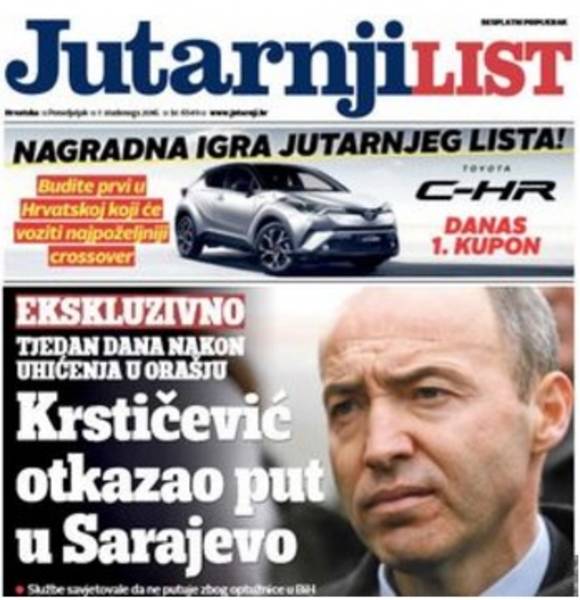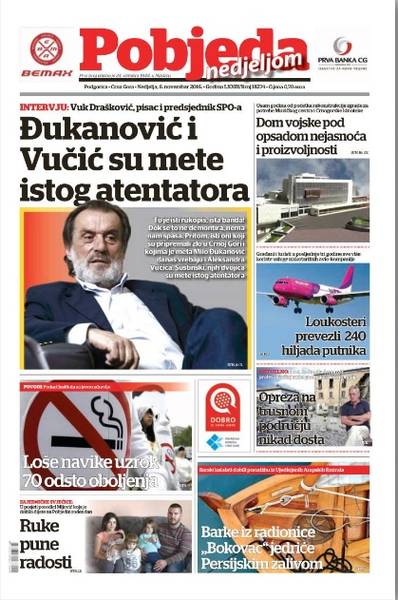War in BiH Continues With Other Means
Adelina Marini, November 7, 2016

Winter is coming to the Balkans, judging by the anxiety in media from the former Yugoslavia. The week begins with a multitude of commentaries on the exceedingly serious situation between Croatia and Bosnia and Herzegovina, caused by the arrest of ten Croatian veterans in the Bosnian town of Orašje. This is also the main topic in today’s press review. In it, you can also read about a very interesting interview of the former Serbian Deputy Prime Minister and Minister of Foreign Affairs Vuk Drašković for the Montenegro daily newspaper Pobjeda. And more – who do Serbs prefer – Trump or Clinton.
Croatian member of the Bosnia and Herzegovina Presidency Dragan Čović is in Zagreb today for an official visit. He has meetings with President Kolinda Grabar-Kitarović and Prime Minister Andrej Plenković. In a large interview for the Croatian Nova television channel last night Mr Čović claims that undoubtedly we are dealing with some kind of political gain, aiming to hinder Bosnia and Herzegovina’s European path. His revelations are more than worrying. According to Mr Čović, BiH cannot step onto the European path until relations are cleared up in a BiH led by law, which is still too distant. He claims that there are para-agencies acting in BiH.
“Most influential people in political life today are saying that we have a state-owned mafia in BiH. Our Chairwoman of the Court of BiH has also in the last half year said that there is a judicial mafia. Not a single of our chief prosecutors has finished their term. You probably do not know this. Even the last got replaced last month. Every single one of his predecessors was suspended. This is the picture in BiH, relationships and the para-system in BiH”, said Čović. Jutarnji list reports today on its front page that Defence Minister Damir Krstičević has postponed his trip to Sarajevo, scheduled for this week. He was supposed to participate on Tuesday in a meeting of the ministers of defence of the countries from the Central European Defence Cooperation. Jutarnji says that the minister's not going to Sarajevo could be interpreted as a political message from the Croatian government to BiH authorities, but also as a defensive measure.
In general, all government members are entitled to diplomatic immunity, but the newspaper reminds the case of the former Israel Prime Minister Ariel Sharon, who was threatened with arrest in Belgium because of his role in the massacre in Palestinian camps. The situation is extremely unpleasant for the Croatian government, because it cannot be foreseen whether and when the BiH prosecution might pull out of a drawer the case against Krstičević, reports Jutarnji. In a commentary, the journalist from the newspaper Ivanka Toma writes that charges with war crimes are a new tool to continuing the war.
“Threats and manipulations with charges of war crimes have turned into a mighty weapon in the hands of BiH and Serbia. Sometimes it is sufficient to simply run a message that an arrest warrant may be issued for some Croatian veteran, or release in the public domain a list of suspects, to cause instability on the Croatian political scene”, writes Toma. In her opinion, PM Plenković should come up with a formula, which would end war crimes and be acceptable to the other side. In an opposing commentary for the same newspaper, famous columnist Jelena Lovrić notes that instead of being outraged by the crimes, Croatia is outraged by the investigations. She warns that the idea is currently gaining strength for Croatia to find an interlocutor regarding the fate of BiH in Serbian PM Aleksandar Vučić. “A fearful thought, which suggests at circumventing the Bosniaks and return to the war politics of the time when Slobodan Milošević and Franjo Tuđman were negotiating on the partitioning of BiH”, writes Jelena Lovrić.
Bosnian website Klix published today an open letter of the Chairman of the Main Committee of the Croatian People’s Sabor Božo Ljubić, in which he expresses his outrage at the allegations of Bakir Izetbegović that the threat to Croats in BiH is a mantra. Ljubić reminds several facts, among which the one that in the years between 2006 and 2014 for the seat of the Croatian member of the Presidency of BiH, which by Constitution is reserved for a representative of the Croats, on two occasions voted the Bosniaks. This way Bosniaks had two members, Serbs had one, and Croats were left without representation in the Presidency. Another fact that is pulled out in the letter are the changes in the Constitution of the Federation BiH entity, proposed by High Representative Petritsch. Due to those changes, Croats have almost no say in the cantons dominated by Bosniaks.
The same people are behind the terror attack attempts in Montenegro and Serbia
 What I highly recommend you read today is the interview of Vuk Drašković for the Montenegro Pobjeda newspaper, which is at its front page. In it the former foreign minister of the former state of Serbia and Montenegro, now leader of the Serbian Renewal Movement, claims that Đukanović and Vučić were targets of one and the same attacker. According to Drašković, the root of current problems needs to be looked for even prior to October 5th of the year 2000.
What I highly recommend you read today is the interview of Vuk Drašković for the Montenegro Pobjeda newspaper, which is at its front page. In it the former foreign minister of the former state of Serbia and Montenegro, now leader of the Serbian Renewal Movement, claims that Đukanović and Vučić were targets of one and the same attacker. According to Drašković, the root of current problems needs to be looked for even prior to October 5th of the year 2000.
“Instead of an uncompromising discovery and resolution of committed crimes, in Serbia was launched the narrative of some large anti-Serbian conspiracy by the anti-Serbian West. It all began even before October 5th of 2000, when Milošević refused to sign in Rambouillet the proposed plan for Kosovo. Not long after that the NATO intervention in FRY followed. This bombing was necessary for Milošević, for he knew that it will forever put at the backseat the crimes, which he and his death squads committed on the territory of former Yugoslavia. At the same time, he was aware that instead of the ‘butcher of the Balkans’, who in the eyes of the world is responsible for the aggression in Croatia and BiH, in Serbia he will be viewed as a victim of the largest army armada in the history of the world.”
Drašković also believes that Serbia even today continues to be in the same vicious circle, talking only about one crime, as though there were none other. Europe is quite reasonably concerned of the possibility of a new conflict among Balkan states, because, in a geostrategic sense, such Balkans would serve Russia as a token in the big game for Ukraine. “Because Russia, as it is now, is a serious state, capable of bringing serious instability to the Balkans. So, I did not have a moment’s doubt that on October 16th a bloodshed was being prepared in Montenegro, as well as the liquidation of Milo Đukanović with the sole aim to hinder not only Montenegro’s NATO membership, but its EU membership as well”, claims Drašković.
On its cover page, the Belgrade Vecernje novosti reports that the terrorist attack in Montenegro was being prepared by Russians, but was averted by the Montenegro Metropolitan Amfilohije. The newspaper quotes the Montenegro special prosecutor Milivoje Katnić, who believes the terrorist attack on Election Day in Montenegro was organised by Russian nationalists assisted by people from Serbia and Montenegro, aiming at a violent overthrow of power in the country. Currently, there is no proof that the state of Russia is involved in this, further claims the prosecutor, quoted by Vecernje novosti.
Serbs prefer Trump
Serbian newspaper Blic publishes today an analysis, in which it asks the question to what extent will the change of power in the White House affect the Balkans. Dr Neven Cvetićanin of the Institute of Social Sciences in Belgrade believes that Trump is preferable, because the Clinton family is being glorified in Kosovo, which means that a possible win for Hillary Clinton could serve those groups which have sympathies for the family. However, it is not reasonable to expect that Hillary Clinton will continue with her husband’s policy, because the world has changed. On the other hand, the majority of Serbs sympathise with Trump and it would be better for Serbia and its regional position if he wins, believes the analyst.
Translated by Stanimir Stoev
 Bakir Izetbegovic, Andrej Plenkovic | © Council of the EU
Bakir Izetbegovic, Andrej Plenkovic | © Council of the EU Aleksandar Vucic, Recep Tayyip Erdogan | © Serbian Presidency
Aleksandar Vucic, Recep Tayyip Erdogan | © Serbian Presidency Jean-Claude Juncker, Zoran Zaev | © European Commission
Jean-Claude Juncker, Zoran Zaev | © European Commission